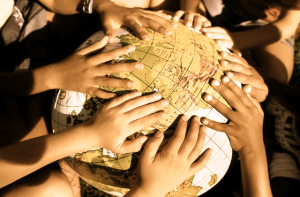
The public humanities represents a series of dynamic interactions between faculty, students, and communities outside the university. The global reach of BYU lends a tremendous diversity to these communities. Our public humanities initiatives, accordingly, take a wide variety of collaborative forms, from lectures and community service to interaction with schools, media productions (TV, radio, and Internet), involvement on arts and educational councils, documentation of oral histories, sponsorship of workshops and festivals, and much more.
In order to highlight faculty efforts in the public humanities, we have divided their contributions into four categories:
Lectures
Faculty generally share their work with two groups. They write books and articles that generally reach relatively small readerships composed of specialists, and they teach courses to a larger, more diverse body of students. But faculty also give public lectures in a variety of venues: libraries, civic organizations, businesses, city councils, churches, and more.
Media
In an age of social media, information is disseminated through multiple channels: Facebook, Twitter, Instagram, Pinterest, and other venues. Many faculty also keep blogs, are featured on podcasts, or host (or support) Youtube channels to reach a wide audience for their work, or for topics of public interest into which their professional expertise gives them unique insight. But BYU is also home to two television and two radio stations which, collectively, reach across much of the planet, so many faculty also contribute to these more traditional media.
Public Schools
Humanities professors visit public schools for a variety of purposes. They act as advocates for literature and proponents of careers in humanities. One of the main interactions humanities professors have with public schools is through enhancing foreign language study. Public school teachers play a pivotal role in putting students on the path of foreign language study. Over the years, BYU faculty have sought to bridge the gap between secondary and post-secondary foreign language study by organizing and hosting summer language camps for high school students that give them an immersion experience in the target language and spur them on to continue their study of foreign languages at the university level. In addition, BYU faculty have collaborated with their high school counterparts in the way of organizing teacher training institutes that include intensive instruction and travel to the target language culture.
Community Collaborations
Faculty often select scholarly projects and research questions based on disciplinary training and academic conversations, usually in tune with wider historical movements and social concerns. And some faculty also conduct scholarship in their areas of expertise with community members and organizations to more effectively address issues such as literacy, language-learning, cultural awareness, and writing.